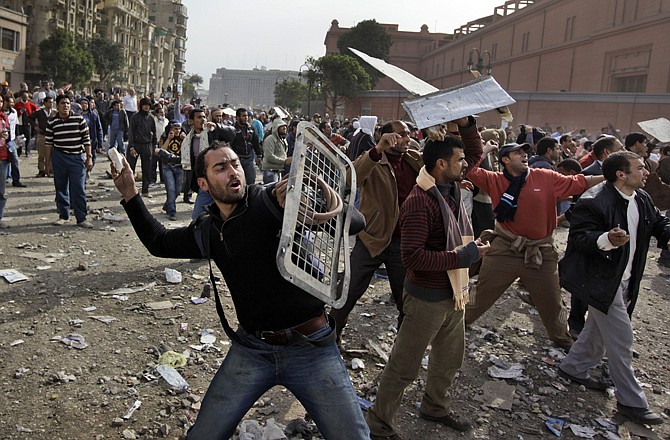CAIRO (AP) - Protesters and government supporters fought in a second day of rock-throwing battles at a central Cairo square while more lawlessness spread around the city. New looting and arson erupted, and gangs of thugs supporting President Hosni Mubarak attacked reporters, foreigners and rights workers while the army rounded up foreign journalists.
As bruised and bandaged protesters danced in victory after forcing back Mubarak loyalists attacking Tahrir Square, the government increasingly spread an image that foreigners were fueling the turmoil and supporting the unprecedented wave of demonstrations demanding the ouster of Mubarak, the country's ruler for nearly three decades.
"When there are demonstrations of this size, there will be foreigners who come and take advantage and they have an agenda to raise the energy of the protesters," Vice President Omar Suleiman said in an interview on state TV.
In an interview with ABC News, Mubarak said he wants to leave office now, but cannot for fear the country will sink deeper into chaos. He blamed the outlawed Muslim Brotherhood, an opposition group, for the violence.
"I was very unhappy about yesterday," Mubarak told ABC's Christiane Amanpour. "I do not want to see Egyptians fighting each other."
Lawlessness that had largely eased since the weekend flared anew. A fire raged in a major supermarket outside Sheikh Zayed, a suburb of the capital, and looters ransacked the building. A residential building neighboring a 5-star hotel on the Nile River corniche was also ablaze, blocks from Tahrir. Other fires erupted in the Cairo district of Shubra, north of the center, security officials said, speaking on condition of anonymity because they were not authorized to talk to the media.
The military and the security forces appeared to be doing little to stop either the looting or the clashes around Tahrir. In the interview, Suleiman said without elaborating that the police had "lost some of its capabilities" and that the army - the main force on the streets of the capital - was struggling to fill the void.
The military is "shouldering duties that are new to it, enforcing the curfew and protecting citizens from thuggery and outlaws," he said. "It's a huge burden on the armed forces to carry out police role that it didn't have before."
The anti-Mubarak movement has vowed to intensify protests. In a speech Tuesday night, Mubarak refused to step down, saying he would serve out the remaining seven months of his term - a halfway concession rejected by the protesters.
At least eight people have been killed and hundreds wounded in the fighting in and around Tahrir. In a sign of the economic impact of the turmoil, Suleiman said 1 million foreign tourists fled over the past nine days, costing $1 billion in lost revenues from one of Egypt's most important industries.
Thursday's fighting centered on and under a highway overpass about 500 yards north of the square's center that pro-government attackers had used as a high ground to rain down stones and firebombs. Anti-Mubarak protesters surged from the square in the afternoon in volleys of stones, bottles and metal bars, chasing their foes around the fly-over.

